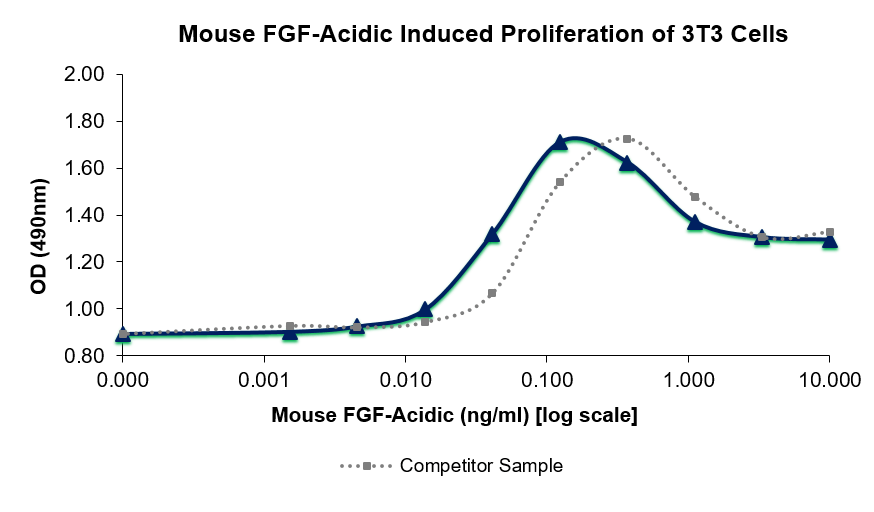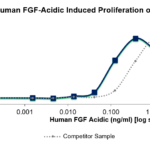Mouse aFGF / FGF1 Bioactive Protein Product Attributes
Product Type: Bioactive Protein
Recombinant aFGF / FGF1 based upon sequence from Mouse
Host: QP5455 protein expressed in E. coli.
Tag: Untagged
Recommended Applications: Bioactive
Application Notes: Please contact us for application specific information for QP5455.
Bioactivity Data: Mouse aFGF / FGF1 induces 3T3 cell proliferation (typical ED50 is around 0.1 ng/ml).
Monomer or Dimer: Monomer
Amino Acid Sequence: MFNLPLGNYK KPKLLYCSNG GHFLRILPDG TVDGTRDRSD QHIQLQLSAE SAGEVYIKGT ETGQYLAMDT EGLLYGSQTP NEECLFLERL EENHYNTYTS KKHAEKNWFV GLKKNGSCKR GPRTHYGQKA ILFLPLPVSS D
Purity: Greater than 95% as determined by SDS-PAGE.
Reconstitution Instructions: A Certificate of Analysis (CofA) will be sent along with the protein and will contain the proper reconstitution instructions.
Concentration of Mouse aFGF / FGF1 Protein: Lyophilized. Concentration determined by reconstitution volume.
Endotoxin Levels: Less than or equal to 1.00 EUs/ug as determined by the LAL method.
Buffer: 10 mM sodium phosphate, 75 mM sodium chloride, pH 7.5
Storage Conditions: Store at -20C to -80C lyophilized. Guaranteed for 1 year at -80C reconstituted and 3 months at 4C reconstituted.
| Recombinant Mouse aFGF / FGF1 Protein General Information | |
|---|---|
| Alternate Names | |
| aFGF, FGF1 Protein, AFGF, FGF-1, ECGFA, FGF-alpha, HBGF-1, ECGFB, ECGF, ECGF-beta, FGFA, HBGF1, GLIO703 | |
| Curated Database and Bioinformatic Data | |
| Gene Symbol | FGF1 |
| Entrez Gene ID | 14164 |
| Ensemble Gene ID | ENSMUSG00000036585 |
| RefSeq Protein Accession(s) | NP_034327.1 |
| RefSeq mRNA Accession(s) | NM_010197.3, XM_006525644.3, XM_006525645.3, XM_006525647.3, XM_006525648.3, XM_006525649.1, XM_011246842.2, XM_011246843.2, XM_017317830.1 |
| UniProt ID(s) | P61148 |
| UniGene ID(s) | Mm.241282 |
| COSMIC ID Link(s) | FGF1 |
| KEGG Gene ID(s) | mmu:14164 |
| General Description of Recombinant Mouse aFGF / FGF1 Protein . | |
| Acidic fibroblast growth factor (aFGF), also known as FGF1, is a potent inducer of DNA synthesis, cell proliferation, and has chemotactic activities. aFGF regulates cardiogenesis through protein kinase C signaling. aFGF also functions as an insulin sensitizer and mediates adipose tissue remodeling. High serum levels of aFGF are associated with type 2 diabetes mellitus (T2DM), suggesting a pathogenic role of aFGF during T2DM. | |
Limitations and Performance Guarantee
This is a life science research product (for Research Use Only). This product is guaranteed to work for a period of two years when stored at -70C or colder, and one year when aliquoted and stored at -20C.






There are no reviews yet.